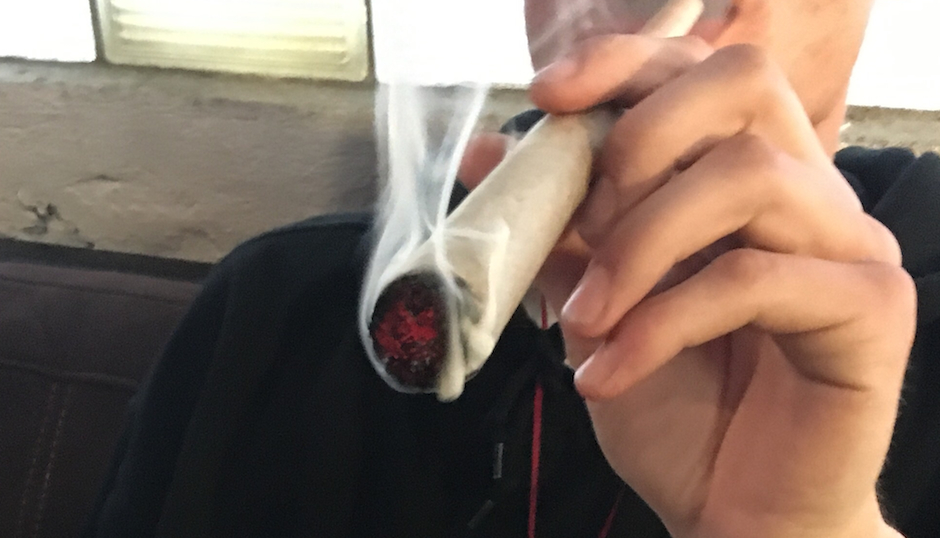Sure, Legalize Pot — but Stop Pretending It’s Harmless

Photo by Victor Fiorillo
Philadelphia is awash in marijuana smoke. Take the Frankford El or the Broad Street Subway and the smell floods your nostrils. Walk downtown and the smell hits you like tear gas from phantom SWAT teams. Sit in Rittenhouse Square and the smell once again inundates your nostrils, only this time you detect a slight smell of skunk.
We are a city of potheads, but is that something to be proud of?
City Council did the right thing when it voted to decriminalize possession of small amounts of marijuana in 2014, but it was also opening a can of worms. A halfway measure like this was bound to be perceived by many as “soft” legalization and a one-way ticket to confusion.
Then came the breaking news about the actual SWAT team raid on the Philly Smoke Session in East Frankford, a raid that Mayor Kenney correctly ID’d as “overkill.” Most police raids are overkill, be they roundups of prostitutes and johns in Kensington or mass arrests of small-time drug operatives. The image of SWAT teams kicking in doors and telling people to line up, Eliot Ness style, is not necessarily an image that most Americans find attractive. History, after all, is replete with uncivil mass arrests, from the aftermath of the Russian Revolution to the even darker roundups at the height of the Nazi era.
However, Philadelphia’s (mostly) millennial pot crusaders, who presume to call themselves activists, were not smoking quietly in their homes, but reveling in the creation of a down-low business: a Reading Terminal–like venue of marijuana vendors (complete with handguns, no less). This flagrant flouting of the law had a kind of sanctuary-city ring to it. Did the organizer, a Mr. NA Poe, who’s certainly no Edgar, take his cue from Mayor Kenney’s flouting of federal immigration law? After all, if Philadelphia can break the law, why deny this bit of iconoclastic ecstasy to weed activists?
Whatever Poe’s motivations — a guest spot on Radio Times with Marty Moss-Coane? — his brazen extravaganza puts one in mind of a bullfighter who finally gets gored by the bull that he thought he had cornered. In this case, the bull’s name was PPD.
A comic high point in the East Frankford saga was when one of the attendees complained that an arresting officer had placed his hands down the front of his boxers, an action that in most THC-tinted atmospheres would almost certainly have ignited 30 minutes of nonstop giggling rather than a sober “uptight” complaint.
Ironically, while the legal status of pot continues to get better, the perception of it as the coolest, safest drug around is slowly giving way as science comes up with unpleasant facts about pot.
In 2012, the Journal Archives of General Psychiatry reported that “Previous research has found that THC can induce symptoms of psychosis in healthy people and worsen psychotic symptoms in people already experiencing them. Long-term cannabis use is also associated with an increased risk of schizophrenia.”
It is estimated that 22 million Americans and about 40 percent of all college students regularly use marijuana. These numbers indicate there’s no going back — but that doesn’t mean that sensible people have to smoke it. If cigarette smoking is bad for you, marijuana is worse.
It’s worse because, as a 2017 Case Western Reserve Study of the medical records of 210,000 cannabis users indicated, users are four times more likely to get heart attacks. There are also problems with mental-health issues and high blood pressure. This evidence was presented at the annual conference of the American College of Cardiology in Washington, D.C. in March.
Potheads, of course, love to say that weed is like alcohol, but they are wrong: People smoke to get high; most people do not drink to get drunk. Marijuana users, like the hundreds who flocked to that East Frankford address, were not looking for the subtle tingly sensation of wine and cheese, but for instant impairment.
This piece has been updated.
Thom Nickels is a journalist and author of 11 books, including Philadelphia Architecture, Spore, and Literary Philadelphia. He was awarded the Philadelphia AIA 2005 Lewis Mumford Award for Architectural Journalism. He’s written for the Philadelphia Inquirer, Philadelphia Daily News, New Oxford Review, and many other publications.


